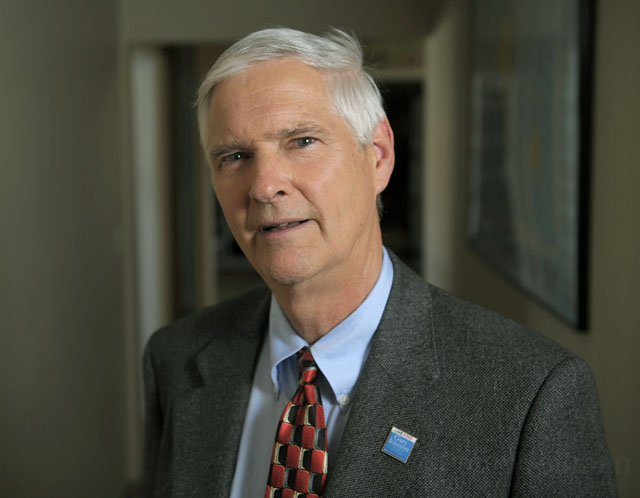James Gray, Libertarian Vice Prez Candidate, Stumps in S.B.
Says the War on Drugs Is a Total Bust and the IRS Should Be Abolished Outright

Don’t bother telling retired Orange County judge James Gray how being vice president isn’t “worth a bucket of warm spit,” a description made famous by a disgruntled former occupant of that office. Gray, best known as the judge who publicly denounced the “war on drugs” as a futile waste of money and human life, is now running for the Number Two spot on the Libertarian ticket and was in town last Friday to press the flesh and raise money.
As a third party candidate, Gray readily acknowledges his is an uphill fight. But Gray — a respected, if outspoken, jurist with more than 25 years on the bench — is running with Gary Johnson, a two-term New Mexico governor, giving the Libertarians undeniable heft when it comes to actual experience. “We’re not out there just to raise issues or score moral victories,” Gray insisted. “We’re out to win.” If 15 percent of Americans who get polled declare they’re voting Libertarian, Gray said he and Johnson will qualify for the nationally televised presidential — and vice presidential — debates. If and when that happens, he predicted, it’s curtains for Mitt Romney and Barack Obama.
“The country craves what we’re talking about,” he declared. “We’re fiscally restrained but socially tolerant.” If that big disaffected middle weren’t enough, Gray added, the Libertarian ticket should also appeal to those fed up with business as usual, Tea Party conservatives and Occupy This progressives. The major fly in Gray’s ointment, however, is that most pollsters don’t ever ask respondents about Libertarians, frequently dismissed as the quirky fringe party where idealists and ideologues from the far left and hard right find common ground. That’s why it’s essential, he said, for anyone called by pollsters to volunteer their Libertarian inclinations.
Like many Libertarians, Gray seems to embody the conflicting yin and yang of American politics. In the 1960s, Gray — an earnest man with pale blue eyes and an unmistakable whiff of mission — volunteered for the Peace Corps after graduating from UCLA. After serving two years in Costa Rica, he entered USC law school, but joined the navy in 1968 when it was clear he’d be drafted. Stationed in Guam, he served as a JAG (Judge Advocate General) officer. Even during the height of countercultural heydays, Gray remained a button-down guy. He insists he never smoked pot, preferring a shot of bourbon and glass of wine. He then became a federal prosecutor, distinguishing himself in 1978 by prosecuting what then was the biggest dope bust ever — 75 kilos of heroin. A card-carrying Republican, Gray worked to get George Deukmejian elected state governor, and Deukmejian returned the favor by appointing Gray — the son of a federal judge — to the bench in 1983.
Presiding over a criminal caseload, Gray said he didn’t give much thought to all the drug cases that came before him. “Heroin meant bad, evil, jail,” he said. “It was pretty simple.” His epiphany came in 1992, after sentencing a man who’d beaten and raped a woman to what was effectively one-and-a-half weeks behind bars. “The tougher we got on nonviolent drug offenders, the softer we became on violent offenders,” he explained. There just wasn’t enough space in jail to lock everyone up, he said, nor was there money to pay for their incarceration.
Gray is hardly the only judge to arrive at this conclusion. He is, however, one of the very few to hold a press conference — as he did on April 8, 1992 — to declare that the war on drugs was a total bust. “Addiction is very hard,” he declared. “But conviction is much harder to overcome.” But by taking profit out of the equation, government can reduce the violence associated with much drug use. Countries like Portugal, Switzerland, and Holland have treated addiction medically rather than criminally, he noted, and their crime rates have dropped as have their rates of addiction. As a Libertarian, Gray said he thinks individual states should decide what course to chart where it comes to drugs.
And as a Libertarian, Gray argues the IRS should be abolished outright and the income tax be replaced with a user — or sales — tax. This, he said, would create jobs, eliminate the livelihood for 60 percent of all lobbyists — whose main function, he charged, is securing tax breaks — and reduce the incentive for much government corruption. Social security would be privatized, immigrants given work visas so long as they follow existing laws, affirmative action ended, and schools vouchers be offered so that parents could select which schools their kids attended.
Gray and Johnson also advocate withdrawal from Afghanistan, the abolition of the PATRIOT Act, and the repeal of the Defense Authorization Act, which allows U.S. nationals suspected of terrorism to be detained and held indefinitely without charges or trial on U.S. soil. “I think it’s better for the American government to be afraid of its citizens than the other way around.” To those who suggest the PATRIOT Act hasn’t led to widespread abuse, he asks, “How would we know?” But perhaps the biggest issue, Gray said, is the mounting national debt. “For every dollar the government spends, 43 cents are borrowed,” he said. “Four more years of that and we’re Greece.”
Gray knows he and Johnson won’t be able to compete with campaign contributions. About 40 people attended the fundraiser held Friday night at the house of Dr. David Bearman, a well-known medical marijuana advocate, and maybe $2,000 raised. Speaking on his mainstream better-known opponents — Romney and Obama — Gray said, “If I was them, I’d be afraid of us, too. We have something they don’t — sincerity.”



